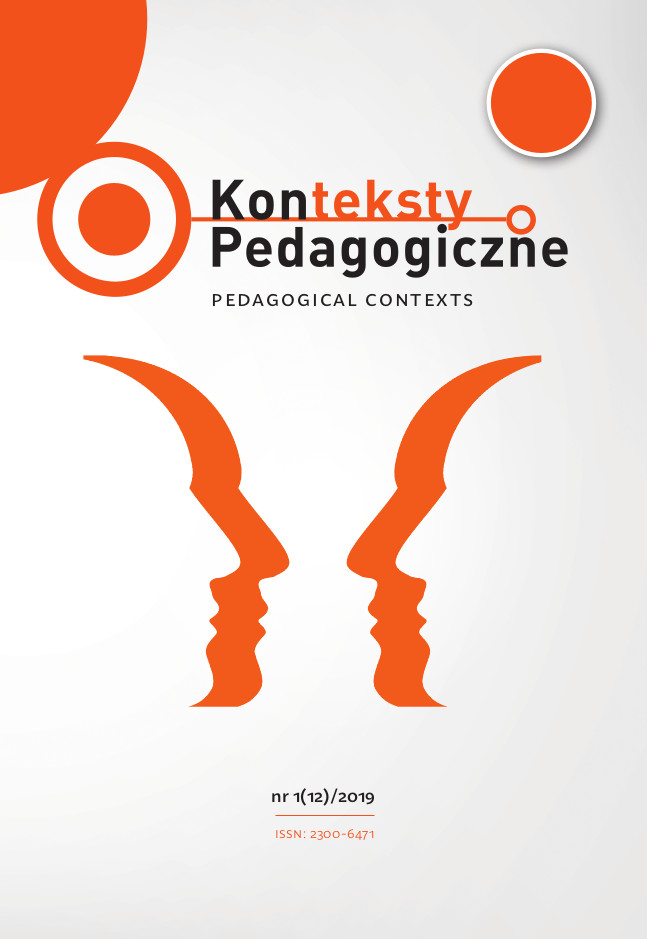Abstrakt
Artykuł poświęcony jest problemowi nauczania uczniów odpowiedzialności za swoje osiągnięcia naukowe. Niezależny i autonomiczny uczeń jest równym partnerem nauczyciela w procesach nauczania i uczenia się. Autor artykułu proponuje technikę samooceny, która pozwala uczniowi rozwinąć samodzielność i zdobyć autonomię, oraz bada rolę autonomii w poprawie umiejętności pisania w języku angielskim wśród uczniów ukraińskich szkół średnich. Zaproponowana technika samooceny składa się z trzech etapów, z których pierwszy obejmuje samoocenę formalnych umiejętności pisania przez samych uczniów. Drugi krok zakłada samoocenę w zakresie doskonalenia umiejętności pisania po angielsku. Ostatni krok obejmuje samoocenę ulepszonych umiejętności pisania. Zgodnie z celem badań, zadania związane z samooceną dały uczniom możliwość rozwijania autonomii i niezależności. Uczestnikami badania było 4 nauczycieli i 40 uczniów dziewiątej klasy ukraińskich szkół średnich.
Bibliografia
Benson, P. (2001). Teaching and Researching Autonomy in Language Learning. Harlow: Pearson Education Limited.
Common European Framework of Reference for Languages: Learning, teaching, assessment Structured overview of all CEFR scales, https://rm.coe.int/168045b15e. [accessed 12.05.2019]
Evans, V. (2017). Successful Writing. Intermediate. London: Express Publishing.
Holec, H. (1981). Autonomy and foreign language learning. Oxford: Pergamon.
Lamb, T. (2007). Learner autonomy and teacher autonomy: Synthesising an agenda. In: T. Lamb and R. Hayo (eds.), Learner and Teacher Autonomy: Concepts, Realities and Responses (pp. 269–285). Amsterdam: John Benjamins Publishing.
Little, D. (2007). Language Learner Autonomy: Some Fundamental Considerations Revisited. Innovation in Language Learning and Teaching, 1(1), 14–29.
Macaro, E. (2007). The shifting dimensions of language learner autonomy. In: T. Lamb and R. Hayo (eds.), Learner and Teacher Autonomy: Concepts, Realities and Responses (pp. 47–63). Amsterdam: John Benjamins Publishing.
Mackey, A. (2006). Feedback, Noticing and Instructed Second Language Learning. Applied linguistics, 27(3), 405–430.
Morska, L. (2017). ESP (English For Specific Purposes) – implications for teaching, Konteksty Pedagogiczne, 2(9), 165–175.
Nasonova, E. (2009). Razvitiye uchebnoy avtonomii studentov neyazykovykh vuzov pri obuchenii inoyazychnomu obshcheniyu. Vestnik gumanitarnogo fakul'teta Ivanovskogo gosudarstvennogo khimiko-tekhnologicheskogo universiteta, 4, 318–322.
Tassinari, M. (2010). Autonomes Fremdsprachenlernen: Komponenten, Kompetenzen, Strategien. Frankfurt am Main: Lang.
Tassinari, M. (2012). Kompetenzen für Lernerautonomie einschätzen, fördern und evaluieren. Fremdsprachen Lehren und Lernen, 41(1), 10–24.
Autor zgodnie z zaleceniem MNiSW, by przeciwdziałać praktykom „ghostwriting” i „guest authorship” składając tekst dołącza oświadczenie Autora/Autorów, w którym deklaruje wkład każdego z Autorów w powstawanie publikacji. Własnoręcznie podpisane oświadczenie należy przesłać na adres redakcji:
Joanna Skibska | w formie skanu przesłać poprzez system OJS (biblioteka wydawcy).
Autorzy nie ponoszą żadnych kosztów w związku z publikacją artykułu na łamach czasopisma Konteksty Pedagogiczne oraz nie otrzymują gratyfikacji finansowej za opublikowanie tekstu. Redakcja zastrzega sobie prawo do wprowadzania niewielkich zmian w artykułach, które nie mają wpływu na merytoryczną stronę publikacji.
Autor (Autorzy) artykułu oświadcza, że przesłane opracowanie nie narusza praw autorskich osób trzecich. Wyraża zgodę na poddanie artykułu procedurze recenzji oraz dokonanie zmian redakcyjnych. Przenosi nieodpłatnie na Wydawnictwo Libron autorskie prawa majątkowe do utworu na polach eksploatacji wymienionych w art. 50 Ustawy z dnia 4 lutego 1994 r. o prawie autorskim i prawach pokrewnych – pod warunkiem, że praca została zaakceptowana do publikacji i opublikowana.
Wydawnictwo Libron posiada autorskie prawa majątkowe do wszystkich treści czasopisma. Zamieszczenie tekstu artykuły w repozytorium, na stronie domowej autora lub na innej stronie jest dozwolone o ile nie wiąże się z pozyskiwaniem korzyści majątkowych, a tekst wyposażony będzie w informacje źródłowe (w tym również tytuł, rok, numer i adres internetowy czasopisma).
Tekst jest udostępniany w internecie na licencji CC-BY-SA

